Nutritional Value of Food Groups and Dietary Requirements for Children
VerifiedAdded on 2023/06/05
|9
|2816
|238
AI Summary
This article discusses the nutritional value of food groups such as grains, vegetables, dairy products, and meats, and their importance in providing sufficient energy for body growth and function. It also covers the dietary requirements for children of different age groups, from 0-1 years to 5-7 years, and the role of early childhood practitioners in meeting child dietary requirements while encouraging healthy eating.
Contribute Materials
Your contribution can guide someone’s learning journey. Share your
documents today.
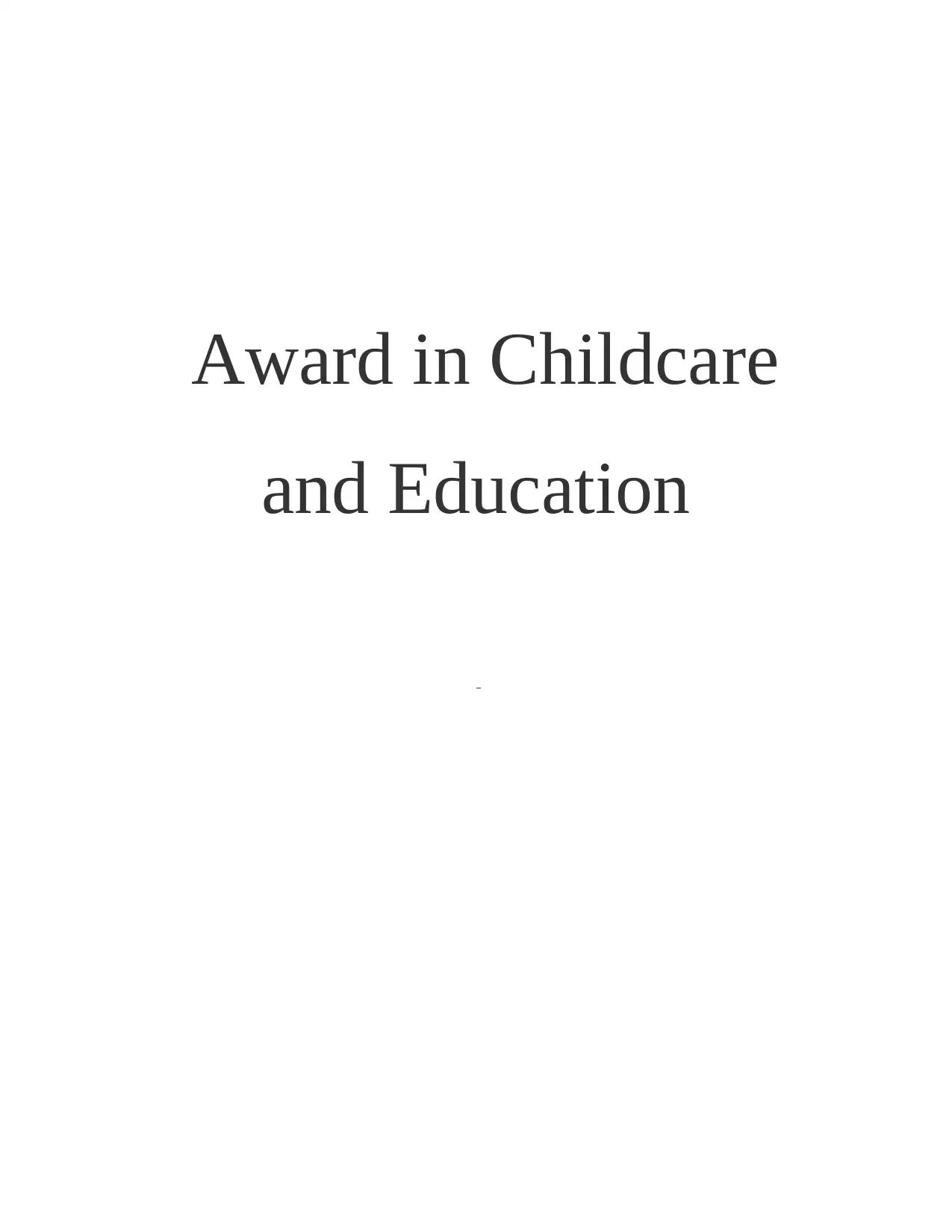
Award in Childcare
and Education
and Education
Secure Best Marks with AI Grader
Need help grading? Try our AI Grader for instant feedback on your assignments.
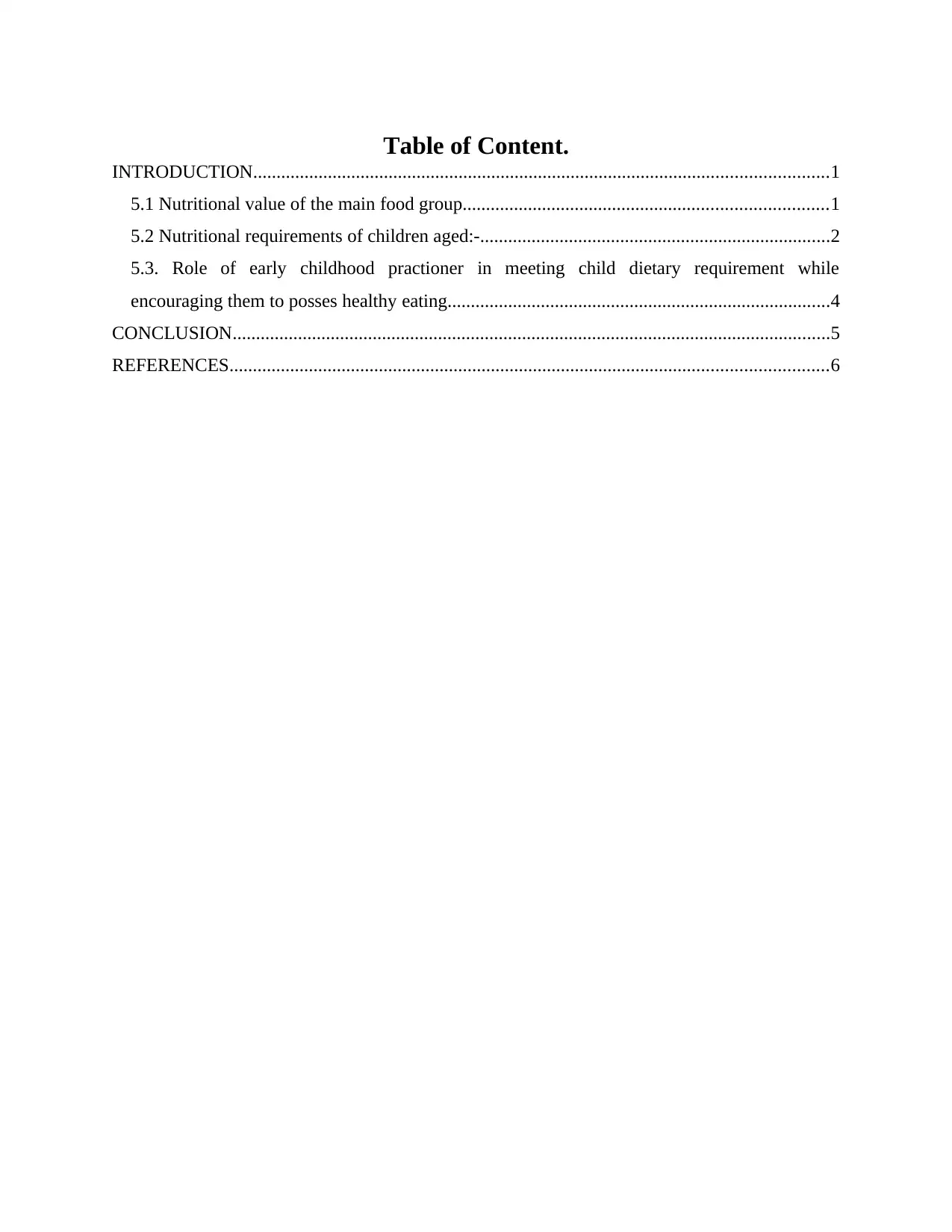
Table of Content.
INTRODUCTION...........................................................................................................................1
5.1 Nutritional value of the main food group..............................................................................1
5.2 Nutritional requirements of children aged:-...........................................................................2
5.3. Role of early childhood practioner in meeting child dietary requirement while
encouraging them to posses healthy eating..................................................................................4
CONCLUSION................................................................................................................................5
REFERENCES................................................................................................................................6
INTRODUCTION...........................................................................................................................1
5.1 Nutritional value of the main food group..............................................................................1
5.2 Nutritional requirements of children aged:-...........................................................................2
5.3. Role of early childhood practioner in meeting child dietary requirement while
encouraging them to posses healthy eating..................................................................................4
CONCLUSION................................................................................................................................5
REFERENCES................................................................................................................................6
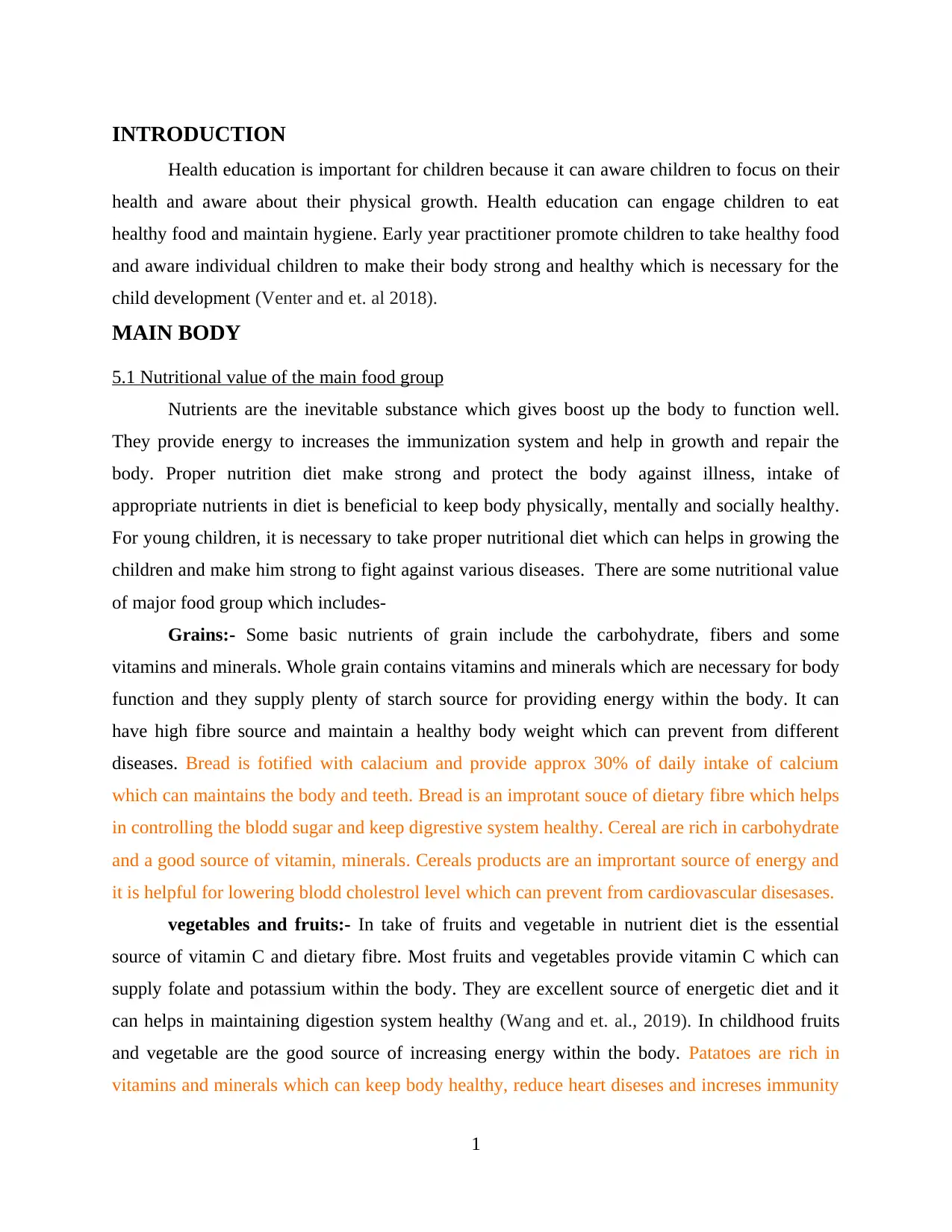
INTRODUCTION
Health education is important for children because it can aware children to focus on their
health and aware about their physical growth. Health education can engage children to eat
healthy food and maintain hygiene. Early year practitioner promote children to take healthy food
and aware individual children to make their body strong and healthy which is necessary for the
child development (Venter and et. al 2018).
MAIN BODY
5.1 Nutritional value of the main food group
Nutrients are the inevitable substance which gives boost up the body to function well.
They provide energy to increases the immunization system and help in growth and repair the
body. Proper nutrition diet make strong and protect the body against illness, intake of
appropriate nutrients in diet is beneficial to keep body physically, mentally and socially healthy.
For young children, it is necessary to take proper nutritional diet which can helps in growing the
children and make him strong to fight against various diseases. There are some nutritional value
of major food group which includes-
Grains:- Some basic nutrients of grain include the carbohydrate, fibers and some
vitamins and minerals. Whole grain contains vitamins and minerals which are necessary for body
function and they supply plenty of starch source for providing energy within the body. It can
have high fibre source and maintain a healthy body weight which can prevent from different
diseases. Bread is fotified with calacium and provide approx 30% of daily intake of calcium
which can maintains the body and teeth. Bread is an improtant souce of dietary fibre which helps
in controlling the blodd sugar and keep digrestive system healthy. Cereal are rich in carbohydrate
and a good source of vitamin, minerals. Cereals products are an imprortant source of energy and
it is helpful for lowering blodd cholestrol level which can prevent from cardiovascular disesases.
vegetables and fruits:- In take of fruits and vegetable in nutrient diet is the essential
source of vitamin C and dietary fibre. Most fruits and vegetables provide vitamin C which can
supply folate and potassium within the body. They are excellent source of energetic diet and it
can helps in maintaining digestion system healthy (Wang and et. al., 2019). In childhood fruits
and vegetable are the good source of increasing energy within the body. Patatoes are rich in
vitamins and minerals which can keep body healthy, reduce heart diseses and increses immunity
1
Health education is important for children because it can aware children to focus on their
health and aware about their physical growth. Health education can engage children to eat
healthy food and maintain hygiene. Early year practitioner promote children to take healthy food
and aware individual children to make their body strong and healthy which is necessary for the
child development (Venter and et. al 2018).
MAIN BODY
5.1 Nutritional value of the main food group
Nutrients are the inevitable substance which gives boost up the body to function well.
They provide energy to increases the immunization system and help in growth and repair the
body. Proper nutrition diet make strong and protect the body against illness, intake of
appropriate nutrients in diet is beneficial to keep body physically, mentally and socially healthy.
For young children, it is necessary to take proper nutritional diet which can helps in growing the
children and make him strong to fight against various diseases. There are some nutritional value
of major food group which includes-
Grains:- Some basic nutrients of grain include the carbohydrate, fibers and some
vitamins and minerals. Whole grain contains vitamins and minerals which are necessary for body
function and they supply plenty of starch source for providing energy within the body. It can
have high fibre source and maintain a healthy body weight which can prevent from different
diseases. Bread is fotified with calacium and provide approx 30% of daily intake of calcium
which can maintains the body and teeth. Bread is an improtant souce of dietary fibre which helps
in controlling the blodd sugar and keep digrestive system healthy. Cereal are rich in carbohydrate
and a good source of vitamin, minerals. Cereals products are an imprortant source of energy and
it is helpful for lowering blodd cholestrol level which can prevent from cardiovascular disesases.
vegetables and fruits:- In take of fruits and vegetable in nutrient diet is the essential
source of vitamin C and dietary fibre. Most fruits and vegetables provide vitamin C which can
supply folate and potassium within the body. They are excellent source of energetic diet and it
can helps in maintaining digestion system healthy (Wang and et. al., 2019). In childhood fruits
and vegetable are the good source of increasing energy within the body. Patatoes are rich in
vitamins and minerals which can keep body healthy, reduce heart diseses and increses immunity
1
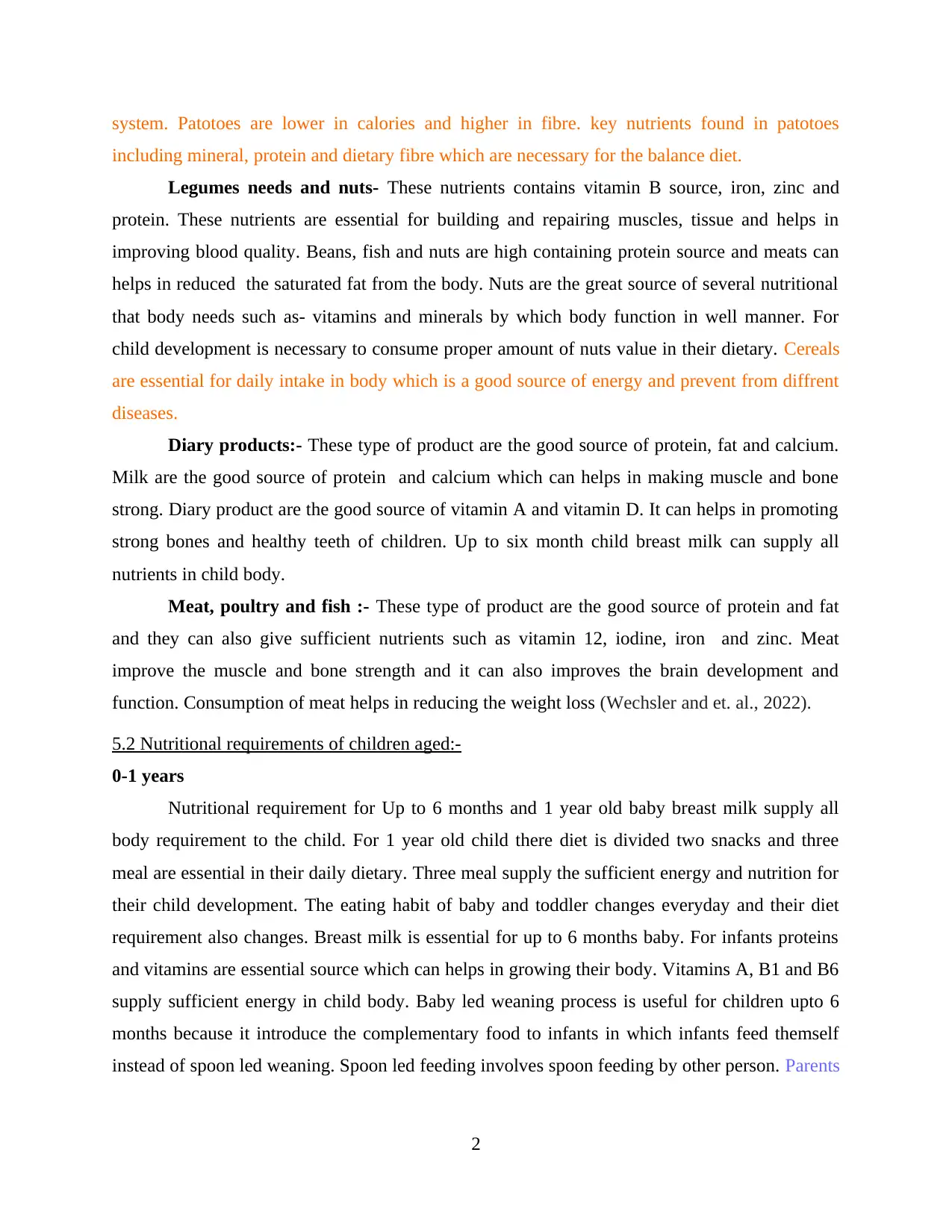
system. Patotoes are lower in calories and higher in fibre. key nutrients found in patotoes
including mineral, protein and dietary fibre which are necessary for the balance diet.
Legumes needs and nuts- These nutrients contains vitamin B source, iron, zinc and
protein. These nutrients are essential for building and repairing muscles, tissue and helps in
improving blood quality. Beans, fish and nuts are high containing protein source and meats can
helps in reduced the saturated fat from the body. Nuts are the great source of several nutritional
that body needs such as- vitamins and minerals by which body function in well manner. For
child development is necessary to consume proper amount of nuts value in their dietary. Cereals
are essential for daily intake in body which is a good source of energy and prevent from diffrent
diseases.
Diary products:- These type of product are the good source of protein, fat and calcium.
Milk are the good source of protein and calcium which can helps in making muscle and bone
strong. Diary product are the good source of vitamin A and vitamin D. It can helps in promoting
strong bones and healthy teeth of children. Up to six month child breast milk can supply all
nutrients in child body.
Meat, poultry and fish :- These type of product are the good source of protein and fat
and they can also give sufficient nutrients such as vitamin 12, iodine, iron and zinc. Meat
improve the muscle and bone strength and it can also improves the brain development and
function. Consumption of meat helps in reducing the weight loss (Wechsler and et. al., 2022).
5.2 Nutritional requirements of children aged:-
0-1 years
Nutritional requirement for Up to 6 months and 1 year old baby breast milk supply all
body requirement to the child. For 1 year old child there diet is divided two snacks and three
meal are essential in their daily dietary. Three meal supply the sufficient energy and nutrition for
their child development. The eating habit of baby and toddler changes everyday and their diet
requirement also changes. Breast milk is essential for up to 6 months baby. For infants proteins
and vitamins are essential source which can helps in growing their body. Vitamins A, B1 and B6
supply sufficient energy in child body. Baby led weaning process is useful for children upto 6
months because it introduce the complementary food to infants in which infants feed themself
instead of spoon led weaning. Spoon led feeding involves spoon feeding by other person. Parents
2
including mineral, protein and dietary fibre which are necessary for the balance diet.
Legumes needs and nuts- These nutrients contains vitamin B source, iron, zinc and
protein. These nutrients are essential for building and repairing muscles, tissue and helps in
improving blood quality. Beans, fish and nuts are high containing protein source and meats can
helps in reduced the saturated fat from the body. Nuts are the great source of several nutritional
that body needs such as- vitamins and minerals by which body function in well manner. For
child development is necessary to consume proper amount of nuts value in their dietary. Cereals
are essential for daily intake in body which is a good source of energy and prevent from diffrent
diseases.
Diary products:- These type of product are the good source of protein, fat and calcium.
Milk are the good source of protein and calcium which can helps in making muscle and bone
strong. Diary product are the good source of vitamin A and vitamin D. It can helps in promoting
strong bones and healthy teeth of children. Up to six month child breast milk can supply all
nutrients in child body.
Meat, poultry and fish :- These type of product are the good source of protein and fat
and they can also give sufficient nutrients such as vitamin 12, iodine, iron and zinc. Meat
improve the muscle and bone strength and it can also improves the brain development and
function. Consumption of meat helps in reducing the weight loss (Wechsler and et. al., 2022).
5.2 Nutritional requirements of children aged:-
0-1 years
Nutritional requirement for Up to 6 months and 1 year old baby breast milk supply all
body requirement to the child. For 1 year old child there diet is divided two snacks and three
meal are essential in their daily dietary. Three meal supply the sufficient energy and nutrition for
their child development. The eating habit of baby and toddler changes everyday and their diet
requirement also changes. Breast milk is essential for up to 6 months baby. For infants proteins
and vitamins are essential source which can helps in growing their body. Vitamins A, B1 and B6
supply sufficient energy in child body. Baby led weaning process is useful for children upto 6
months because it introduce the complementary food to infants in which infants feed themself
instead of spoon led weaning. Spoon led feeding involves spoon feeding by other person. Parents
2
Secure Best Marks with AI Grader
Need help grading? Try our AI Grader for instant feedback on your assignments.
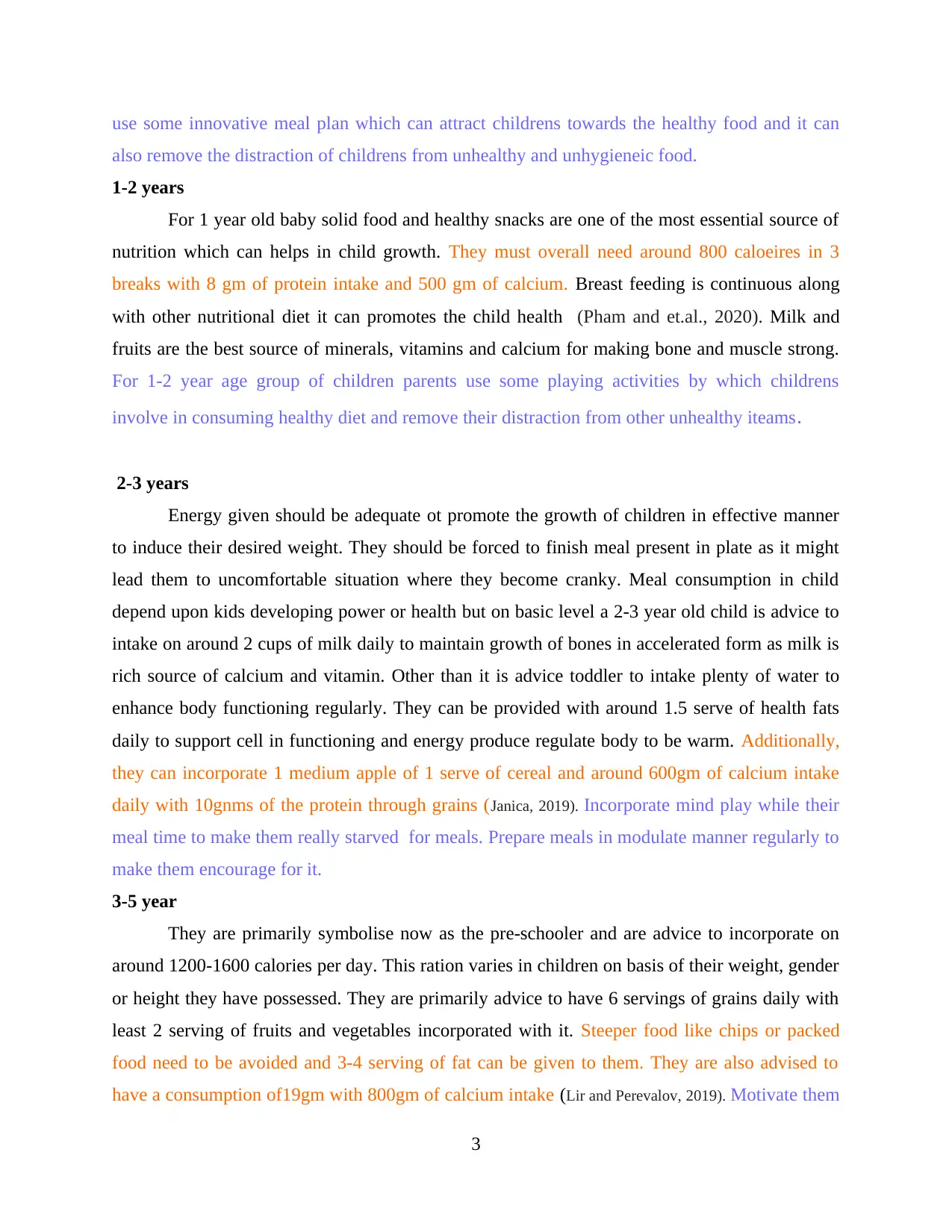
use some innovative meal plan which can attract childrens towards the healthy food and it can
also remove the distraction of childrens from unhealthy and unhygieneic food.
1-2 years
For 1 year old baby solid food and healthy snacks are one of the most essential source of
nutrition which can helps in child growth. They must overall need around 800 caloeires in 3
breaks with 8 gm of protein intake and 500 gm of calcium. Breast feeding is continuous along
with other nutritional diet it can promotes the child health (Pham and et.al., 2020). Milk and
fruits are the best source of minerals, vitamins and calcium for making bone and muscle strong.
For 1-2 year age group of children parents use some playing activities by which childrens
involve in consuming healthy diet and remove their distraction from other unhealthy iteams.
2-3 years
Energy given should be adequate ot promote the growth of children in effective manner
to induce their desired weight. They should be forced to finish meal present in plate as it might
lead them to uncomfortable situation where they become cranky. Meal consumption in child
depend upon kids developing power or health but on basic level a 2-3 year old child is advice to
intake on around 2 cups of milk daily to maintain growth of bones in accelerated form as milk is
rich source of calcium and vitamin. Other than it is advice toddler to intake plenty of water to
enhance body functioning regularly. They can be provided with around 1.5 serve of health fats
daily to support cell in functioning and energy produce regulate body to be warm. Additionally,
they can incorporate 1 medium apple of 1 serve of cereal and around 600gm of calcium intake
daily with 10gnms of the protein through grains (Janica, 2019). Incorporate mind play while their
meal time to make them really starved for meals. Prepare meals in modulate manner regularly to
make them encourage for it.
3-5 year
They are primarily symbolise now as the pre-schooler and are advice to incorporate on
around 1200-1600 calories per day. This ration varies in children on basis of their weight, gender
or height they have possessed. They are primarily advice to have 6 servings of grains daily with
least 2 serving of fruits and vegetables incorporated with it. Steeper food like chips or packed
food need to be avoided and 3-4 serving of fat can be given to them. They are also advised to
have a consumption of19gm with 800gm of calcium intake (Lir and Perevalov, 2019). Motivate them
3
also remove the distraction of childrens from unhealthy and unhygieneic food.
1-2 years
For 1 year old baby solid food and healthy snacks are one of the most essential source of
nutrition which can helps in child growth. They must overall need around 800 caloeires in 3
breaks with 8 gm of protein intake and 500 gm of calcium. Breast feeding is continuous along
with other nutritional diet it can promotes the child health (Pham and et.al., 2020). Milk and
fruits are the best source of minerals, vitamins and calcium for making bone and muscle strong.
For 1-2 year age group of children parents use some playing activities by which childrens
involve in consuming healthy diet and remove their distraction from other unhealthy iteams.
2-3 years
Energy given should be adequate ot promote the growth of children in effective manner
to induce their desired weight. They should be forced to finish meal present in plate as it might
lead them to uncomfortable situation where they become cranky. Meal consumption in child
depend upon kids developing power or health but on basic level a 2-3 year old child is advice to
intake on around 2 cups of milk daily to maintain growth of bones in accelerated form as milk is
rich source of calcium and vitamin. Other than it is advice toddler to intake plenty of water to
enhance body functioning regularly. They can be provided with around 1.5 serve of health fats
daily to support cell in functioning and energy produce regulate body to be warm. Additionally,
they can incorporate 1 medium apple of 1 serve of cereal and around 600gm of calcium intake
daily with 10gnms of the protein through grains (Janica, 2019). Incorporate mind play while their
meal time to make them really starved for meals. Prepare meals in modulate manner regularly to
make them encourage for it.
3-5 year
They are primarily symbolise now as the pre-schooler and are advice to incorporate on
around 1200-1600 calories per day. This ration varies in children on basis of their weight, gender
or height they have possessed. They are primarily advice to have 6 servings of grains daily with
least 2 serving of fruits and vegetables incorporated with it. Steeper food like chips or packed
food need to be avoided and 3-4 serving of fat can be given to them. They are also advised to
have a consumption of19gm with 800gm of calcium intake (Lir and Perevalov, 2019). Motivate them
3
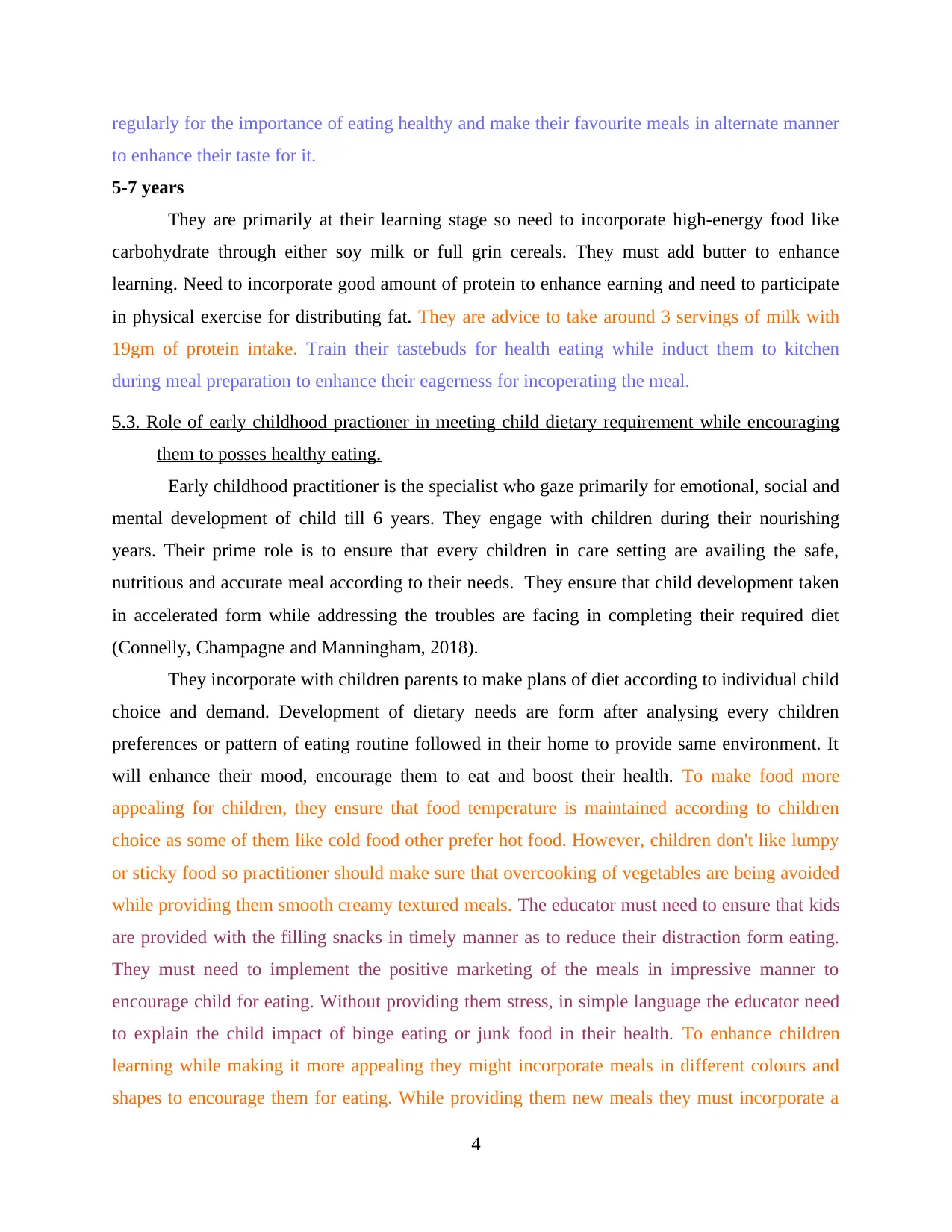
regularly for the importance of eating healthy and make their favourite meals in alternate manner
to enhance their taste for it.
5-7 years
They are primarily at their learning stage so need to incorporate high-energy food like
carbohydrate through either soy milk or full grin cereals. They must add butter to enhance
learning. Need to incorporate good amount of protein to enhance earning and need to participate
in physical exercise for distributing fat. They are advice to take around 3 servings of milk with
19gm of protein intake. Train their tastebuds for health eating while induct them to kitchen
during meal preparation to enhance their eagerness for incoperating the meal.
5.3. Role of early childhood practioner in meeting child dietary requirement while encouraging
them to posses healthy eating.
Early childhood practitioner is the specialist who gaze primarily for emotional, social and
mental development of child till 6 years. They engage with children during their nourishing
years. Their prime role is to ensure that every children in care setting are availing the safe,
nutritious and accurate meal according to their needs. They ensure that child development taken
in accelerated form while addressing the troubles are facing in completing their required diet
(Connelly, Champagne and Manningham, 2018).
They incorporate with children parents to make plans of diet according to individual child
choice and demand. Development of dietary needs are form after analysing every children
preferences or pattern of eating routine followed in their home to provide same environment. It
will enhance their mood, encourage them to eat and boost their health. To make food more
appealing for children, they ensure that food temperature is maintained according to children
choice as some of them like cold food other prefer hot food. However, children don't like lumpy
or sticky food so practitioner should make sure that overcooking of vegetables are being avoided
while providing them smooth creamy textured meals. The educator must need to ensure that kids
are provided with the filling snacks in timely manner as to reduce their distraction form eating.
They must need to implement the positive marketing of the meals in impressive manner to
encourage child for eating. Without providing them stress, in simple language the educator need
to explain the child impact of binge eating or junk food in their health. To enhance children
learning while making it more appealing they might incorporate meals in different colours and
shapes to encourage them for eating. While providing them new meals they must incorporate a
4
to enhance their taste for it.
5-7 years
They are primarily at their learning stage so need to incorporate high-energy food like
carbohydrate through either soy milk or full grin cereals. They must add butter to enhance
learning. Need to incorporate good amount of protein to enhance earning and need to participate
in physical exercise for distributing fat. They are advice to take around 3 servings of milk with
19gm of protein intake. Train their tastebuds for health eating while induct them to kitchen
during meal preparation to enhance their eagerness for incoperating the meal.
5.3. Role of early childhood practioner in meeting child dietary requirement while encouraging
them to posses healthy eating.
Early childhood practitioner is the specialist who gaze primarily for emotional, social and
mental development of child till 6 years. They engage with children during their nourishing
years. Their prime role is to ensure that every children in care setting are availing the safe,
nutritious and accurate meal according to their needs. They ensure that child development taken
in accelerated form while addressing the troubles are facing in completing their required diet
(Connelly, Champagne and Manningham, 2018).
They incorporate with children parents to make plans of diet according to individual child
choice and demand. Development of dietary needs are form after analysing every children
preferences or pattern of eating routine followed in their home to provide same environment. It
will enhance their mood, encourage them to eat and boost their health. To make food more
appealing for children, they ensure that food temperature is maintained according to children
choice as some of them like cold food other prefer hot food. However, children don't like lumpy
or sticky food so practitioner should make sure that overcooking of vegetables are being avoided
while providing them smooth creamy textured meals. The educator must need to ensure that kids
are provided with the filling snacks in timely manner as to reduce their distraction form eating.
They must need to implement the positive marketing of the meals in impressive manner to
encourage child for eating. Without providing them stress, in simple language the educator need
to explain the child impact of binge eating or junk food in their health. To enhance children
learning while making it more appealing they might incorporate meals in different colours and
shapes to encourage them for eating. While providing them new meals they must incorporate a
4
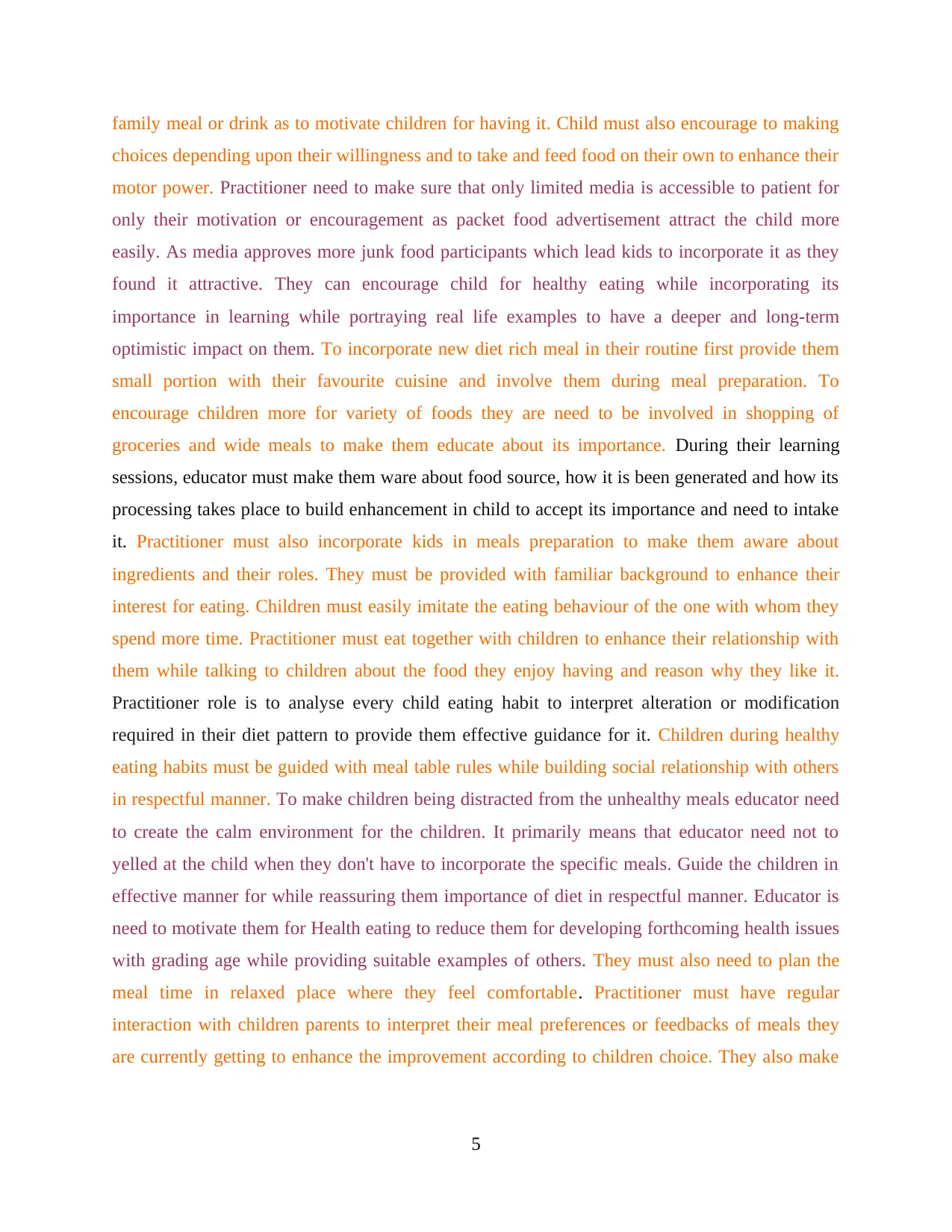
family meal or drink as to motivate children for having it. Child must also encourage to making
choices depending upon their willingness and to take and feed food on their own to enhance their
motor power. Practitioner need to make sure that only limited media is accessible to patient for
only their motivation or encouragement as packet food advertisement attract the child more
easily. As media approves more junk food participants which lead kids to incorporate it as they
found it attractive. They can encourage child for healthy eating while incorporating its
importance in learning while portraying real life examples to have a deeper and long-term
optimistic impact on them. To incorporate new diet rich meal in their routine first provide them
small portion with their favourite cuisine and involve them during meal preparation. To
encourage children more for variety of foods they are need to be involved in shopping of
groceries and wide meals to make them educate about its importance. During their learning
sessions, educator must make them ware about food source, how it is been generated and how its
processing takes place to build enhancement in child to accept its importance and need to intake
it. Practitioner must also incorporate kids in meals preparation to make them aware about
ingredients and their roles. They must be provided with familiar background to enhance their
interest for eating. Children must easily imitate the eating behaviour of the one with whom they
spend more time. Practitioner must eat together with children to enhance their relationship with
them while talking to children about the food they enjoy having and reason why they like it.
Practitioner role is to analyse every child eating habit to interpret alteration or modification
required in their diet pattern to provide them effective guidance for it. Children during healthy
eating habits must be guided with meal table rules while building social relationship with others
in respectful manner. To make children being distracted from the unhealthy meals educator need
to create the calm environment for the children. It primarily means that educator need not to
yelled at the child when they don't have to incorporate the specific meals. Guide the children in
effective manner for while reassuring them importance of diet in respectful manner. Educator is
need to motivate them for Health eating to reduce them for developing forthcoming health issues
with grading age while providing suitable examples of others. They must also need to plan the
meal time in relaxed place where they feel comfortable. Practitioner must have regular
interaction with children parents to interpret their meal preferences or feedbacks of meals they
are currently getting to enhance the improvement according to children choice. They also make
5
choices depending upon their willingness and to take and feed food on their own to enhance their
motor power. Practitioner need to make sure that only limited media is accessible to patient for
only their motivation or encouragement as packet food advertisement attract the child more
easily. As media approves more junk food participants which lead kids to incorporate it as they
found it attractive. They can encourage child for healthy eating while incorporating its
importance in learning while portraying real life examples to have a deeper and long-term
optimistic impact on them. To incorporate new diet rich meal in their routine first provide them
small portion with their favourite cuisine and involve them during meal preparation. To
encourage children more for variety of foods they are need to be involved in shopping of
groceries and wide meals to make them educate about its importance. During their learning
sessions, educator must make them ware about food source, how it is been generated and how its
processing takes place to build enhancement in child to accept its importance and need to intake
it. Practitioner must also incorporate kids in meals preparation to make them aware about
ingredients and their roles. They must be provided with familiar background to enhance their
interest for eating. Children must easily imitate the eating behaviour of the one with whom they
spend more time. Practitioner must eat together with children to enhance their relationship with
them while talking to children about the food they enjoy having and reason why they like it.
Practitioner role is to analyse every child eating habit to interpret alteration or modification
required in their diet pattern to provide them effective guidance for it. Children during healthy
eating habits must be guided with meal table rules while building social relationship with others
in respectful manner. To make children being distracted from the unhealthy meals educator need
to create the calm environment for the children. It primarily means that educator need not to
yelled at the child when they don't have to incorporate the specific meals. Guide the children in
effective manner for while reassuring them importance of diet in respectful manner. Educator is
need to motivate them for Health eating to reduce them for developing forthcoming health issues
with grading age while providing suitable examples of others. They must also need to plan the
meal time in relaxed place where they feel comfortable. Practitioner must have regular
interaction with children parents to interpret their meal preferences or feedbacks of meals they
are currently getting to enhance the improvement according to children choice. They also make
5
Paraphrase This Document
Need a fresh take? Get an instant paraphrase of this document with our AI Paraphraser
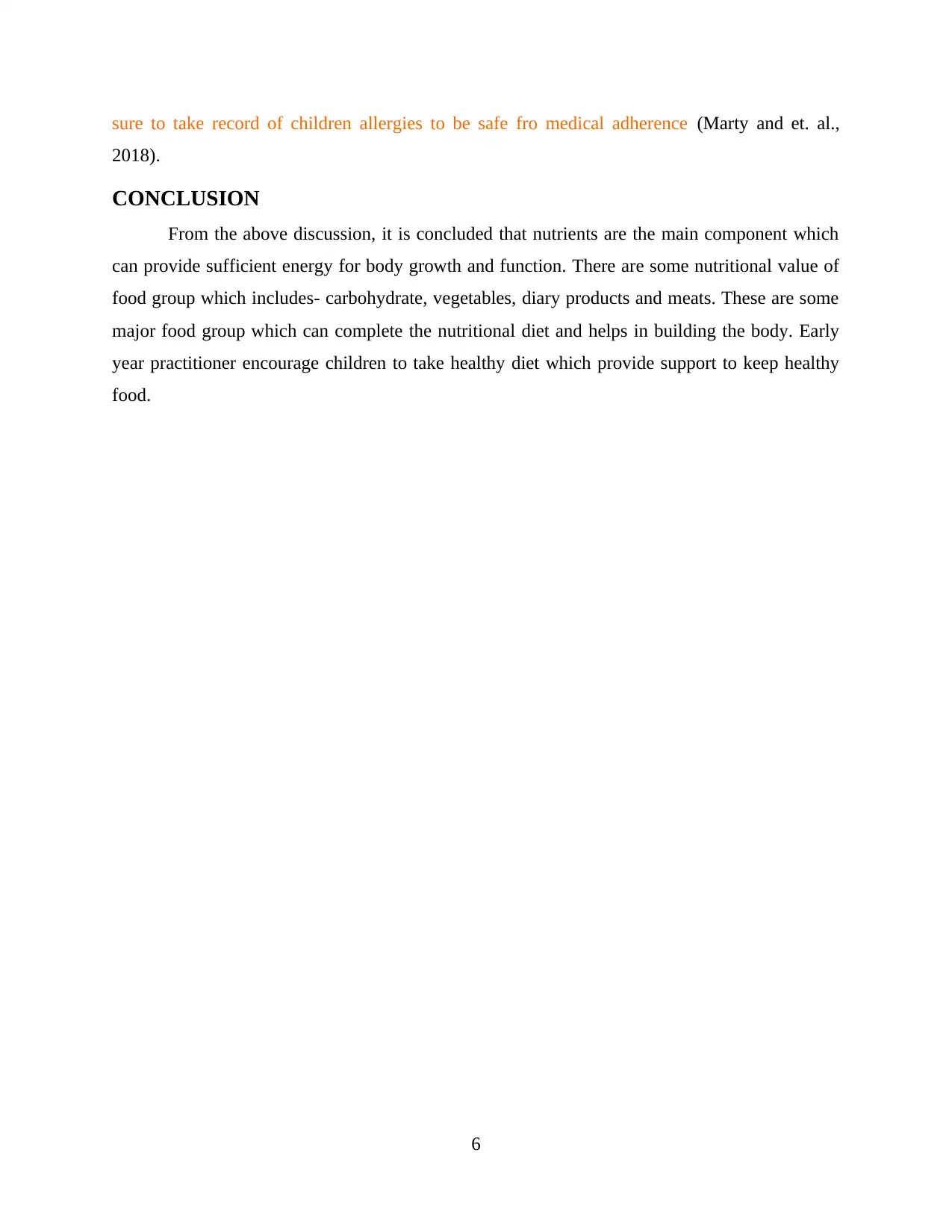
sure to take record of children allergies to be safe fro medical adherence (Marty and et. al.,
2018).
CONCLUSION
From the above discussion, it is concluded that nutrients are the main component which
can provide sufficient energy for body growth and function. There are some nutritional value of
food group which includes- carbohydrate, vegetables, diary products and meats. These are some
major food group which can complete the nutritional diet and helps in building the body. Early
year practitioner encourage children to take healthy diet which provide support to keep healthy
food.
6
2018).
CONCLUSION
From the above discussion, it is concluded that nutrients are the main component which
can provide sufficient energy for body growth and function. There are some nutritional value of
food group which includes- carbohydrate, vegetables, diary products and meats. These are some
major food group which can complete the nutritional diet and helps in building the body. Early
year practitioner encourage children to take healthy diet which provide support to keep healthy
food.
6
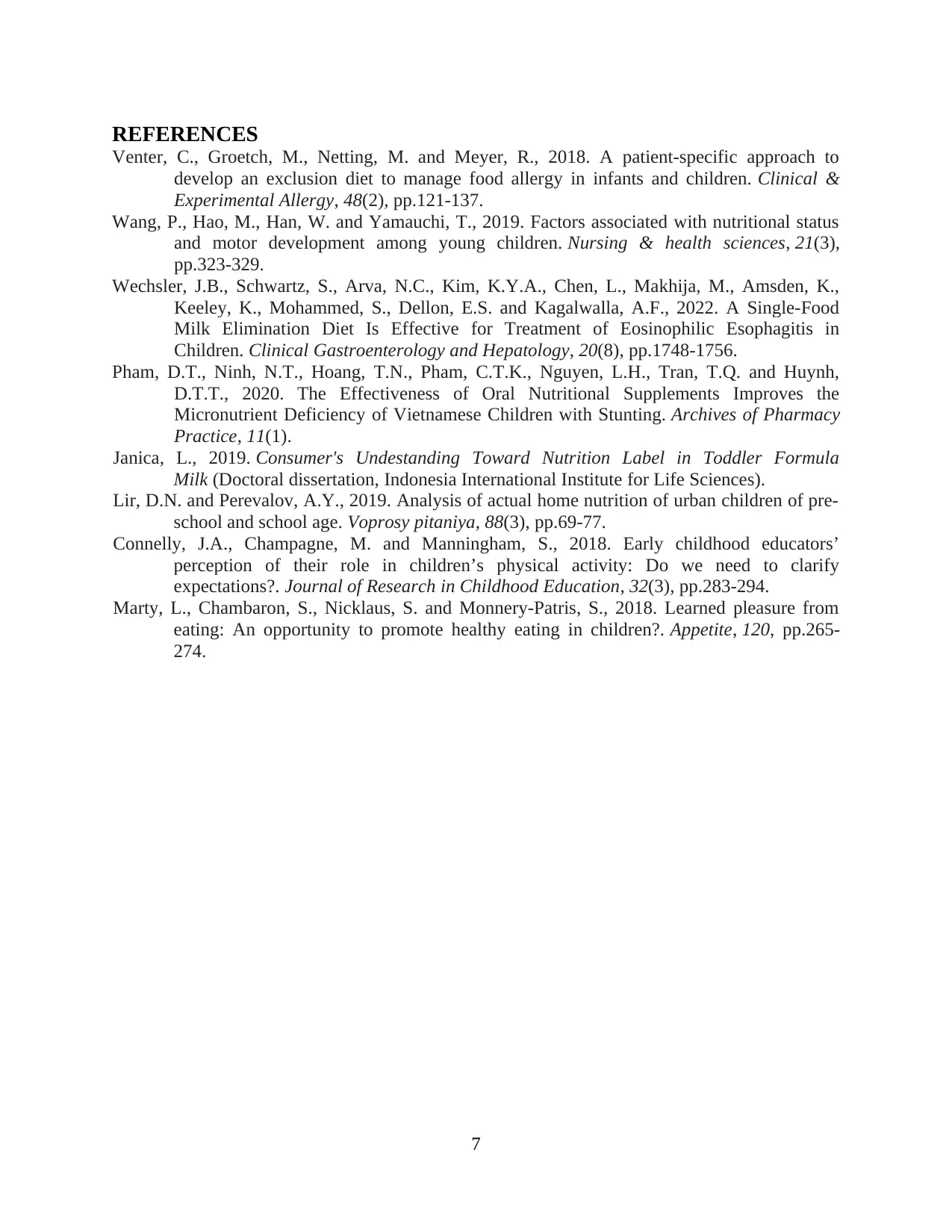
REFERENCES
Venter, C., Groetch, M., Netting, M. and Meyer, R., 2018. A patient‐specific approach to
develop an exclusion diet to manage food allergy in infants and children. Clinical &
Experimental Allergy, 48(2), pp.121-137.
Wang, P., Hao, M., Han, W. and Yamauchi, T., 2019. Factors associated with nutritional status
and motor development among young children. Nursing & health sciences, 21(3),
pp.323-329.
Wechsler, J.B., Schwartz, S., Arva, N.C., Kim, K.Y.A., Chen, L., Makhija, M., Amsden, K.,
Keeley, K., Mohammed, S., Dellon, E.S. and Kagalwalla, A.F., 2022. A Single-Food
Milk Elimination Diet Is Effective for Treatment of Eosinophilic Esophagitis in
Children. Clinical Gastroenterology and Hepatology, 20(8), pp.1748-1756.
Pham, D.T., Ninh, N.T., Hoang, T.N., Pham, C.T.K., Nguyen, L.H., Tran, T.Q. and Huynh,
D.T.T., 2020. The Effectiveness of Oral Nutritional Supplements Improves the
Micronutrient Deficiency of Vietnamese Children with Stunting. Archives of Pharmacy
Practice, 11(1).
Janica, L., 2019. Consumer's Undestanding Toward Nutrition Label in Toddler Formula
Milk (Doctoral dissertation, Indonesia International Institute for Life Sciences).
Lir, D.N. and Perevalov, A.Y., 2019. Analysis of actual home nutrition of urban children of pre-
school and school age. Voprosy pitaniya, 88(3), pp.69-77.
Connelly, J.A., Champagne, M. and Manningham, S., 2018. Early childhood educators’
perception of their role in children’s physical activity: Do we need to clarify
expectations?. Journal of Research in Childhood Education, 32(3), pp.283-294.
Marty, L., Chambaron, S., Nicklaus, S. and Monnery-Patris, S., 2018. Learned pleasure from
eating: An opportunity to promote healthy eating in children?. Appetite, 120, pp.265-
274.
7
Venter, C., Groetch, M., Netting, M. and Meyer, R., 2018. A patient‐specific approach to
develop an exclusion diet to manage food allergy in infants and children. Clinical &
Experimental Allergy, 48(2), pp.121-137.
Wang, P., Hao, M., Han, W. and Yamauchi, T., 2019. Factors associated with nutritional status
and motor development among young children. Nursing & health sciences, 21(3),
pp.323-329.
Wechsler, J.B., Schwartz, S., Arva, N.C., Kim, K.Y.A., Chen, L., Makhija, M., Amsden, K.,
Keeley, K., Mohammed, S., Dellon, E.S. and Kagalwalla, A.F., 2022. A Single-Food
Milk Elimination Diet Is Effective for Treatment of Eosinophilic Esophagitis in
Children. Clinical Gastroenterology and Hepatology, 20(8), pp.1748-1756.
Pham, D.T., Ninh, N.T., Hoang, T.N., Pham, C.T.K., Nguyen, L.H., Tran, T.Q. and Huynh,
D.T.T., 2020. The Effectiveness of Oral Nutritional Supplements Improves the
Micronutrient Deficiency of Vietnamese Children with Stunting. Archives of Pharmacy
Practice, 11(1).
Janica, L., 2019. Consumer's Undestanding Toward Nutrition Label in Toddler Formula
Milk (Doctoral dissertation, Indonesia International Institute for Life Sciences).
Lir, D.N. and Perevalov, A.Y., 2019. Analysis of actual home nutrition of urban children of pre-
school and school age. Voprosy pitaniya, 88(3), pp.69-77.
Connelly, J.A., Champagne, M. and Manningham, S., 2018. Early childhood educators’
perception of their role in children’s physical activity: Do we need to clarify
expectations?. Journal of Research in Childhood Education, 32(3), pp.283-294.
Marty, L., Chambaron, S., Nicklaus, S. and Monnery-Patris, S., 2018. Learned pleasure from
eating: An opportunity to promote healthy eating in children?. Appetite, 120, pp.265-
274.
7
1 out of 9
Related Documents
Your All-in-One AI-Powered Toolkit for Academic Success.
+13062052269
info@desklib.com
Available 24*7 on WhatsApp / Email
![[object Object]](/_next/static/media/star-bottom.7253800d.svg)
Unlock your academic potential
© 2024 | Zucol Services PVT LTD | All rights reserved.





